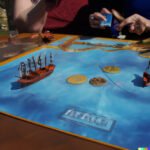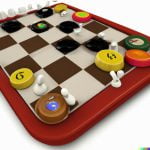Are you looking to dominate the Cuba board game? Look no further than this comprehensive strategy guide filled with valuable tips, tricks, and insights to help you conquer the game. Whether you’re a beginner or an experienced player, this guide will provide you with the necessary knowledge to improve your gameplay and increase your chances of winning. From understanding the game mechanics to analyzing different player strategies, this article covers it all.
The Cuba board game is a strategic economic game that challenges players to navigate through various aspects of Cuban society, such as politics, commerce, and agriculture. With a focus on resource management and player interaction, mastering this game requires careful planning and calculated decision-making. In this guide, we will delve into the history of the Cuba board game, explore its mechanics and objectives, and provide key strategies for achieving victory.
As we progress through this strategy guide, we will also examine different player strategies and provide insights from experienced players to give you a well-rounded understanding of the game. Additionally, we’ll discuss common mistakes to avoid and offer recommendations to help you fine-tune your skills. Whether you’re striving for your first win or aiming to enhance your gameplay, let this article be your ultimate companion in mastering the Cuba board game.
History of the Cuba Board Game
The Cuba board game was first introduced in 2007 and has since gained a dedicated following among board game enthusiasts. Designed by Michael Rieneck and Stefan Stadler, the game is set in pre-revolution Cuba where players take on the role of wealthy plantation owners. With its unique blend of resource management and strategic gameplay, Cuba has become a beloved classic in the world of board gaming.
The game’s roots can be traced back to various Euro-style board games that gained popularity in the late 20th century. These games typically emphasize strategy, planning, and indirect player interaction. Cuba follows this tradition by challenging players to carefully manage their resources, make shrewd decisions, and outmaneuver their opponents in order to win.
One notable aspect of the history of Cuba is its influence on subsequent board games. The success of Cuba paved the way for similar Euro-style games with intricate gameplay mechanics and strategic depth. Its impact can be seen in subsequent board games that have adopted similar resource management elements and player-driven decision making processes.
- The Cuba board game was designed by Michael Rieneck and Stefan Stadler
- It was first introduced in 2007
- Cuba belongs to the Euro-style genre of board games
- Its success influenced subsequent board games with similar gameplay mechanics
Overview of Game Mechanics and Objectives
Game Mechanics
The Cuba board game is a strategic economic game that involves players taking on the roles of plantation owners in Cuba during the 1950s. The objective of the game is to gain wealth and influence by growing crops, constructing buildings, and utilizing the labor force to ultimately contribute to the development of the country. Players will need to carefully manage their resources, make tactical decisions, and invest in various elements of their plantations in order to succeed.
Objectives
The main objective of the Cuba board game is to accumulate victory points by successfully fulfilling different tasks and goals throughout the game. These goals often include exporting goods, constructing buildings, and navigating political events. As players navigate these objectives, they must also keep an eye on their income and avoid falling into debt, as financial stability plays a crucial role in achieving victory.
Game Flow
The game is played over multiple rounds, with each round consisting of several phases including selecting character roles, gathering resources, taking actions such as planting crops or constructing buildings, and evaluating each player’s progress. Understanding how these phases interact with one another is key in effectively strategizing for success in the Cuba board game. Players must carefully balance short-term gains with long-term investments in order to come out ahead by the end of the game.
Key Strategies for Winning the Game
When it comes to winning the Cuba board game, there are several key strategies that players can employ to increase their chances of success. Here are some essential strategies to keep in mind:
1. Building and Developing Plantations: One of the most important aspects of the game is building and developing plantations on the different regions of Cuba. It is crucial to focus on acquiring and producing goods, as these will ultimately determine a player’s victory points.
2. Utilizing the Role Cards Effectively: The role cards in the game play a significant role in determining a player’s actions each turn. It is essential to use these role cards strategically, taking advantage of their unique abilities to maximize resources and gain an advantage over opponents.
3. Balancing Money and Victory Points: In the Cuba board game, managing money and victory points is vital for success. Players must strike a balance between investing in buildings, acquiring resources, and earning victory points to ensure a competitive edge over other players.
By employing these key strategies and making strategic decisions throughout the game, players can enhance their chances of winning and mastering the intricacies of Cuba board game strategy guide.
Analysis of Different Player Strategies
Player Strategy 1: Building Plantations
One common strategy used by players in the Cuba board game is focusing on building and managing plantations efficiently. By strategically acquiring and developing plantations, players can generate valuable resources such as sugar, tobacco, coffee, and fruit. These resources are essential for fulfilling the demands of the different buildings and fulfill key objectives in the game. Players who prioritize plantation management may focus on acquiring buildings that provide bonuses or additional privileges related to plantations.
Player Strategy 2: Utilizing Buildings Effectively
Another player strategy involves utilizing buildings effectively to maximize benefits and points. In the Cuba board game, there are various types of buildings that offer different advantages, including production buildings, residential buildings, special buildings, and national buildings. Players may adopt a strategy of focusing on specific types of buildings depending on their chosen role and long-term game objectives.
Player Strategy 3: Leveraging Role Cards
The role cards in the Cuba board game play a crucial role in shaping player strategies. Each role card provides different abilities and opportunities for players to take actions during the game rounds. Some players may adopt a strategy of leveraging role cards strategically to gain advantages over others or to secure important resources. Understanding how to effectively use role cards can significantly impact a player’s success in the game.
By analyzing different player strategies such as building plantations, utilizing buildings effectively, and leveraging role cards, individuals can gain valuable insights into the diverse approaches that can lead to success in the Cuba board game. This analysis allows both new and experienced players to understand the various options available when developing their own winning strategies for playing this engaging board game.
Tips and Tricks for Mastering the Game
As you dive deeper into playing the Cuba board game, you will find that mastering the game requires a strategic mindset and careful planning. Here are some tips and tricks to help you improve your gameplay and increase your chances of winning.
First and foremost, it is crucial to focus on building your resources early in the game. Make sure to prioritize acquiring money, raw materials, and goods, as these are essential for fulfilling objectives and gaining victory points. By doing so, you can establish a strong foundation for your strategy and have more options available to you as the game progresses.
Another important aspect to consider is the use of character cards effectively. Each character card provides unique abilities that can greatly impact your gameplay. Take the time to analyze the character cards available and think about how to best utilize their abilities to further your own objectives while hindering those of your opponents.
Furthermore, being adaptable is key to success in the Cuba board game. As the game unfolds, circumstances may change rapidly, requiring you to adjust your strategy accordingly. Stay flexible and be open to altering your plans based on the current state of the game and the actions of other players.
Remember, mastering the Cuba board game takes practice and a willingness to learn from both victories and defeats. By honing your skills with these tips in mind, you can enhance your gameplay experience and enjoy greater success at the table.
| Tips | Tricks |
|---|---|
| Focus on building resources early | Use character cards effectively |
| Be adaptable throughout the game | Learn from victories and defeats |
Common Mistakes to Avoid
One of the most common mistakes to avoid in the Cuba Board Game is not focusing on building up your resources. It can be tempting to go after immediate rewards and benefits, but neglecting long-term resource accumulation can put you at a disadvantage later in the game. Without sufficient resources, you may find yourself unable to execute your strategy effectively or leverage opportunities as they arise. Therefore, it is crucial to prioritize resource gathering and management throughout the game.
Another mistake that players often make is overlooking the importance of building structures. Structures not only provide valuable bonuses and abilities, but they also contribute to your overall victory points. Neglecting to build structures can limit your options and hinder your progress towards winning the game. Make sure to allocate time and resources towards constructing buildings as they can greatly impact your chances of success.
Lastly, a common error that players should steer clear of is underestimating the value of fulfilling roles. Each role in the game offers unique advantages and should not be disregarded. Focusing too narrowly on one specific role or ignoring others can limit your flexibility and leave you vulnerable to other players’ strategies. It is important to diversify your role selections and adapt them according to changing circumstances in the game.
| Common Mistakes | Recommendations |
|---|---|
| Not prioritizing resource accumulation | Focus on gathering resources consistently throughout the game. |
| Neglecting building structures | Allocate resources for construction of buildings as they provide valuable advantages. |
| Underestimating role fulfillment | Diversify role selections and adapt them based on evolving game situations. |
Experienced Player Insights and Recommendations
After mastering the basics of the Cuba Board Game and understanding key strategies for winning, it’s essential to seek insights and recommendations from experienced players. Seasoned players often have a deeper understanding of the game’s dynamics, enabling them to offer valuable advice to newcomers or intermediate players looking to improve their gameplay. These insights can provide a competitive edge and enhance overall gaming experience.
One key recommendation from experienced players is to be adaptable and flexible in your approach. While having a solid strategy is important, being able to adjust your tactics based on the actions of other players and the state of the game board can be crucial. Flexibility allows you to capitalize on opportunities as they arise and mitigate potential setbacks, ultimately increasing your chances of success in the game.
Another insight from seasoned players is to prioritize building a diverse set of resources and buildings. In the Cuba Board Game, having a well-rounded portfolio of resources and structures can provide various benefits, such as income, victory points, or special abilities. By diversifying your assets, you can create multiple pathways to victory and adapt to different game situations. Experienced players often emphasize the importance of balance in resource management and strategic development.
Additionally, seasoned players recommend paying close attention to timing and sequencing when making decisions in the game. Understanding when to implement certain actions or when to pursue specific objectives can significantly impact your progress. Being mindful of timing allows you to maximize efficiency and optimize your overall gameplay strategy. Experienced players often highlight the nuanced nature of decision-making in the game and stress the value of foresight and planning ahead.
By seeking insights and recommendations from experienced players, enthusiasts of the Cuba Board Game can gain valuable perspectives that contribute to their growth as strategic gamers. Embracing these insights can lead to enhanced gameplay experiences and increased competitive prowess at both casual gatherings and formal tournaments.
Conclusion and Final Thoughts
In conclusion, the Cuba Board Game offers a unique and immersive gaming experience that has captivated players for years. With its rich history, engaging game mechanics, and emphasis on strategic decision-making, it continues to be a favorite among board game enthusiasts. Whether you’re a novice or an experienced player, there are always new strategies to explore and master in the quest for victory.
As we’ve explored in this Cuba Board Game Strategy Guide, understanding the game’s history provides valuable insight into its development and influences. This knowledge can enhance your appreciation for the game and contribute to your overall gameplay experience. Additionally, familiarizing yourself with the game mechanics and objectives is essential for formulating successful strategies that align with your playstyle.
Analyzing different player strategies has revealed the diverse approaches that can lead to success in the Cuba Board Game. From focusing on building structures to leveraging character abilities, each strategy presents its own challenges and rewards.
By utilizing the tips and tricks provided in this guide and learning from common mistakes to avoid, you can refine your gameplay and increase your chances of achieving victory. Ultimately, mastering the game requires dedication, creativity, and adaptability – qualities that make the Cuba Board Game a timeless classic in the world of board gaming.
Frequently Asked Questions
What Is the Strategy of the Board Game Dao?
The strategy of the board game Dao revolves around players trying to outmaneuver their opponents by strategically placing their pieces on the board to capture key areas and block their opponent’s movements. It requires careful planning and foresight to win.
What Is the Board Game Called Strategy?
The board game called Strategy is a classic abstract strategy game that involves players maneuvering their army pieces across the board to capture their opponent’s flag while protecting their own. It requires deep thinking and tactical skill to outwit the other player.
What Is the Most Strategic Board Game Ever?
Determining the most strategic board game ever is subjective, but some contenders for this title include chess, Go, and Risk. These games require players to think multiple moves ahead, consider various strategies, and adapt to their opponent’s actions, making them extremely strategic in nature.

I love playing all kinds of games – from classics like Monopoly to modern favourites like Ticket to Ride.
I created this blog as a way to share my love of board games with others, and provide information on the latest releases and news in the industry.





